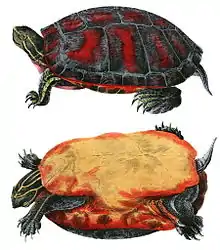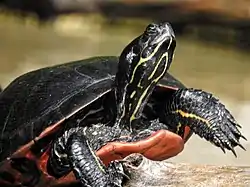| Northern red-bellied cooter | |
|---|---|
 | |
| Scientific classification | |
| Domain: | Eukaryota |
| Kingdom: | Animalia |
| Phylum: | Chordata |
| Class: | Reptilia |
| Order: | Testudines |
| Suborder: | Cryptodira |
| Superfamily: | Testudinoidea |
| Family: | Emydidae |
| Genus: | Pseudemys |
| Species: | P. rubriventris |
| Binomial name | |
| Pseudemys rubriventris | |
| Synonyms[3] | |
| |
The northern red-bellied turtle (Pseudemys rubriventris)[2] or American red-bellied turtle is a species of turtle in the Pseudemys (cooter) genus of the family Emydidae.
Description
A fairly large river turtle, it averages about 29 to 30 cm (11 to 12 in) in length and weighs on average around 3 kg (6.6 lb), although large females can measure up to 40 cm (16 in) in length.[4]
Distribution and habitat
It is endemic to the United States. The current range of the red-bellied turtle includes a population in Massachusetts, the Plymouth red-bellied turtle, which was previously considered a distinct subspecies (Pseudemys rubriventris bangsi) as well as the coastal areas of New Jersey, Pennsylvania, Delaware, Maryland, Virginia and North Carolina.

The red-bellied turtle has appeared on Pennsylvania Fish Commission lists of endangered amphibians and reptiles since 1978 (McCoy 1985). By 1985 the red-bellied turtle was known to exist in Pennsylvania only in isolated colonies in a few counties (McCoy 1985). Small (less than thirty individuals) colonies were known in Manor and Silver lakes in Bucks county, the Tinicum wetlands in Philadelphia and Delaware Counties, the West Branch of Conococheague Creek in Franklin County and possibly Springton Reservoir in Delaware County (McCoy 1985).
Conservation
The red-bellied turtle is a threatened[5] species within Pennsylvania. However, the Plymouth red-bellied turtle distinct population segment is listed as endangered by the US Fish and Wildlife Service[6] as well as the Division of Fisheries and Wildlife (Massachusetts).[7]
The potential threats to red-bellied turtle populations are numerous. Primary threats include wetland loss, habitat fragmentation, pollution, collecting of turtles for pets, food or other trophies, competition with the invasive red-eared slider turtle (Trachemys scripta elegans) for food, habitat, basking sites or nesting sites, and the potential for hybridization with red-eared slider turtles.
The Massachusetts wildlife preserve foundation has started to repopulate the turtles by placing them in many southeastern Massachusetts ponds. One example is at Long and Little Long Pond in Plymouth, Massachusetts, where the population is starting to regrow.
References
- ↑ van Dijk, P.P. (2016) [errata version of 2011 assessment]. "Pseudemys rubriventris". IUCN Red List of Threatened Species. 2011: e.T18460A97427406. doi:10.2305/IUCN.UK.2011-1.RLTS.T18460A8299690.en. Retrieved 28 October 2022.
- 1 2 Rhodin 2010, p. 000.102
- ↑ Fritz Uwe; Peter Havaš (2007). "Checklist of Chelonians of the World" (PDF). Vertebrate Zoology. 57 (2): 195–196. Archived from the original (PDF) on 2011-05-01. Retrieved 29 May 2012.
- ↑ http://www.iucnredlist.org/apps/redlist/details/18460/0
- ↑ "58 Pa. Code § 75.2 Threatened species". Pennsylvania Code. Commonwealth of Pennsylvania. 22 April 2023. Retrieved 15 July 2023.
- ↑ "Plymouth Redbelly Turtle (Pseudemys rubriventris bangsi)". Environmental Conservation Online System. U.S. Fish & Wildlife Service. Retrieved 15 July 2023.
- ↑ "Amphibians and Reptiles in Massachusetts". mass.gov. Commonwealth of Massachusetts. 2023. Retrieved 15 July 2023.
- Tortoise & Freshwater Turtle Specialist Group 1996. Pseudemys rubriventris. 2006 IUCN Red List of Threatened Species. Downloaded on 29 July 2007.
- Article title
- https://web.archive.org/web/20070824020806/http://www.dgif.state.va.us/wildlife/species/display.asp?id=030057
- McCoy, C. J. 1985. Species of Special Concern in Pennsylvania, in H. H. Genoways and F. J. Brenner, editors. Special Publication of Carnegie Museum of Natural Pennsylvania. Carnegie Museum of Natural History, Pittsburgh, PA.
- http://www.mass.gov/eea/docs/dfg/nhesp/species-and-conservation/nhfacts/pseudemys-rubriventris.pdf
- Bibliography
- Rhodin, Anders G.J.; van Dijk, Peter Paul; Inverson, John B.; Shaffer, H. Bradley (2010-12-14). "Turtles of the World 2010 Update: Annotated Checklist of Taxonomy, Synonymy, Distribution and Conservation Status" (PDF). Archived from the original (PDF) on 2011-07-17.
